 Petzlover
PetzloverBoth Doxiepom and Muggin are originated from United States. Doxiepom may grow 13 cm / 6 inches higher than Muggin. Doxiepom may weigh 10 kg / 22 pounds lesser than Muggin. Both Doxiepom and Muggin has almost same life span. Both Doxiepom and Muggin has same litter size. Doxiepom requires Moderate Maintenance. But Muggin requires High Maintenance
The Doxiepom is a small dog known as a designer breed which has originated from crossing the well known Dachshund dog with another well known pure-breed dog, the Pomeranian.
This has resulted in the hybrid breed – the Doxiepom.
Both these pure bred dogs have their own history each but the Doxiepom is a new dog breed. It is believed that this mix of Pomeranian and Dachshund was originally developed in the United States in the 1990’s and while he doesn’t have much of a history, you can have a look at the history of the parent dog breeds.
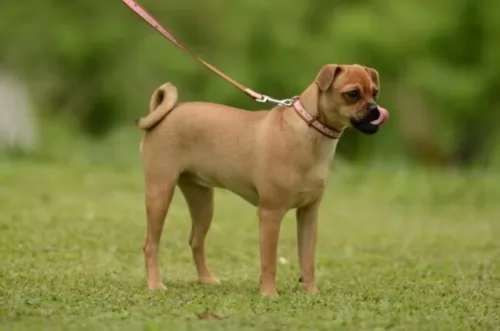 The Muggin is not a purebred dog but rather a cross breed. The hybrid dog population has exploding in the United States in the past ten to fifteen years. A lot of the success of crossbreeding can be attributed to the marketing of these dogs as “Designer Breeds”.
The Muggin is not a purebred dog but rather a cross breed. The hybrid dog population has exploding in the United States in the past ten to fifteen years. A lot of the success of crossbreeding can be attributed to the marketing of these dogs as “Designer Breeds”.
Designer breeds are developed because someone wants some of the characteristics of Breed X and some of the characteristics of Breed Y. Therefore, Designer breed XY is developed. In order to understand this hybrid dog, you need to understand the two purebred breeds they come from. The Muggin is the result of crossing the purebred Pug and the purebred Miniature Pinscher or Min Pin. So, we need to look at the origins of these two purebred breeds.
They are also referred to as Pin Pugs, Min Pin Pug, Pug Pin, Pugscher and were originally the Carlin Pinscher. However, these days there are other breeds besides the Pug and Min Pin making up the gene pool for the Carlin Pinscher. Because of this the Muggin has been separated from the Carlin Pinscher. The American Canine Hybrid Club has accepted the Muggin name for the Pug Min Pin cross.
Pugs are originally a Chinese breed and they were companions rather than working dogs of any kind. During the Han Dynasty they were the dogs of royalty. At the same time there were dogs very much like the pug in Japan and Tibet. The Pugs came to Europe by way of trades with the Dutch who then brought them to Europe. They were named the Mopshond and they caught the eye of the royalty in Europe as well.
Pugs were imported to the United States after the U.S. Civil War and in 1885 they were recognized by the American Kennel Club and called Pugs.
The Min Pin traces its origins to Germany a few hundred years ago. They were “ratters”, guarding the house and stables from all types of vermin. Most dog people believe that the Min Pin is much older than this, perhaps by thousands of years. Yet there is no detailed history to support that. Most believe the breed comes from the German Pinscher line. There might also be some Daschund and Greyhound in that line.
They were once called the Reh Pinscher. This was their name when they came to North America in 1919 and then the breed was renamed in 1972. The Miniature Pinscher Club of America was started in the early 1900’s while the AKC recognized the Min Pin in 1929. Today the Miniature Pinscher is a family dog, a companion.
The Muggin is a loving and loyal dog. All they want is for you to be happy and to share that happiness with them. They can also easily become a one person dog and bond intensely with that one person. They are not a hybrid that you can leave home alone while you go to work for 8 to 10 hours a day. No, the Muggin needs attention and lots of it. Despite this they are great with both kids and other dogs.
Because they are a cross breed, they are not recognized by the American Kennel Club. However, some hybrid registries do recognize the Muggin. These include the Designer Breed Registry, the International Designer Canine Registry, The Designer Dogs Kennel Club, the American Canine Hybrid Club, and the Dog Registry of America.
The Doxiepom is a small dog - a cross between the Dachshund and the Pomeranian, and this means he can have characteristics from each of these breeds.
They’re short dogs, standing at roughly 12cm to 27cm. A full grown Pomeranian Dachshund mix can weigh between 3kg and 12kg.
With a fairly long body from the Dachshund side, he has floppy ears or they can be semi-erect and the tail is long.
You can’t really say what the dog will look like exactly and the coat may be long or short with some of the coat colors being tan, black or brown.
Their dependent nature can mean these little dogs battling with separation anxiety, and he is a dog that doesn’t like being left alone for long periods of time.
He easily attaches himself to just one member of the family while being friendly and loving to everyone else as well.
They’e fun loving, playful dogs and want to be involved in their family’s activities, whether indoors or out. They’re friendly, but are aloof with strangers. He makes a great watchdog too, barking when strangers enter the property.
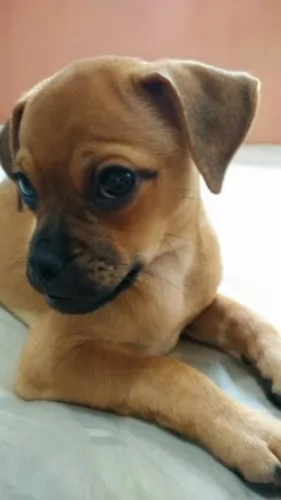 As previously mentioned, the Muggin is a cross between the Pug and the Miniature Pinscher. They are small, shave sturdy legs, floppy ears, and a wrinkled forehead for the most part. Like all hybrids however, all first generation dogs do not look the same. Some might resemble the Min Pin more and others the Pug. Some might have the stockier body of the Pug and the short tail of the Min Pin. Or one could have the Pug’s curly tail and the athletic body of the Min Pin. The snout can be short or long, the ears heavy and floppy or small and thin.
As previously mentioned, the Muggin is a cross between the Pug and the Miniature Pinscher. They are small, shave sturdy legs, floppy ears, and a wrinkled forehead for the most part. Like all hybrids however, all first generation dogs do not look the same. Some might resemble the Min Pin more and others the Pug. Some might have the stockier body of the Pug and the short tail of the Min Pin. Or one could have the Pug’s curly tail and the athletic body of the Min Pin. The snout can be short or long, the ears heavy and floppy or small and thin.
Their coats will usually be fine and short, and colors can vary a lot. They might be black and tan like a Min Pin, or more like a Pug with a solid color of cream, brown, black, white or golden. They also tend to shed quite a bit no matter which parent they take after the most. They will either have brown noses and black eyes or brown eyes and black noses or any combination of black and brown.
If Muggins are only bred to Muggins the second and third generations will resemble each other more than the first generations will. However, at this point many breeders will try to strengthen the breed by occasionally adding in to the gene pool other dog breeds.
One of the strong characteristics of the the Doxiepom is that he shares a strong bond with his human family.
He is such a amicable little dog, ready to join in with the children in their games as well as in the activities of the adults.
He craves human companionship, and if you provide him with a happy home, he promises to give you devoted companionship throughout his life.
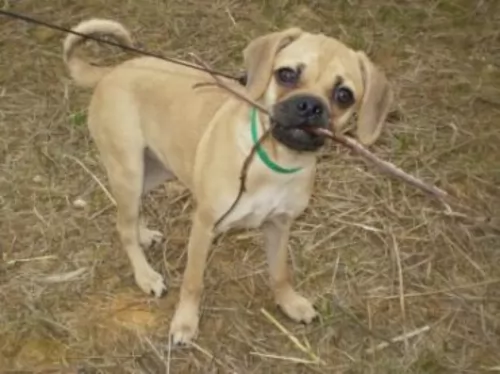 They are good with children but should be supervised.
They are good with children but should be supervised.
Energetic and loving little dogs.
Very adaptable if taken for walks or has space in a yard. Can live anywhere under those circumstances.
Very intelligent but strong willed dog. Needs strong leadership from their person.
The Doxiepom is a little dog who isn’t going to cost you a lot of time at the vet, however there are some typical dog illnesses that you will do well to know about.
Generally the Doxiepom has a lifespan of about 12 to 16 years and with good care, your pet can reach this age too.
As far as health problems go, your dog could be affected, although it is unlikely, as he is a robust dog breed.
Your pet could inherit health problems more common to either of the breeds. Little dogs suffer with their own set of heath problems and these could be back problems, dental- and eye disease and allergies.
A common health problem with a small dog like this is obesity. They don’t need a lot of food but because they’re so friendly and entertaining, some owners over-feed them.
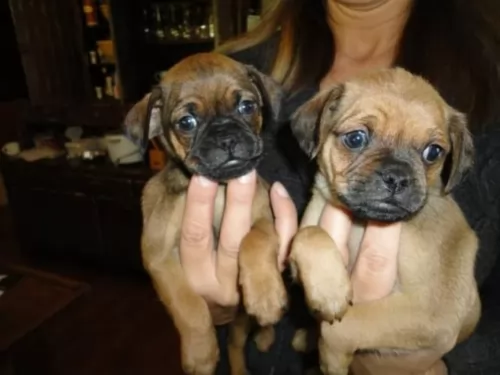 The first generation of Muggins may face all the health issues of either or both their parents, while second and third generations tend to have less health issues, They types of issues the first generation of Muggins might face include:
The first generation of Muggins may face all the health issues of either or both their parents, while second and third generations tend to have less health issues, They types of issues the first generation of Muggins might face include:
Nerve Degeneration – Degenerative Myelopathy or Dm – causes paralysis and eventually fatal.
The Doxipom has moderate grooming requirements, shedding somewhat throughout the year, so brushing him twice a week will keep the coat shiny and healthy.
If your pet has turned out to have more long hair than short, he may require some professional grooming. His nails will also need clipping and his ears will also need to be checked for infection.
Small dogs often battle more with dental and gum problems, and plaque and tartar buildup results when food gets trapped between the teeth, leading to gingivitis which can lead to premature tooth loss. Keeping the teeth clean is therefore important.
Small dogs have quicker metabolisms than big dogs and they also mature faster than the larger dogs. Smaller dogs actually require more calories per kilogram than big dogs because they burn up energy faster than larger breeds.
It is therefore important to feed your small dog the right amount of food to support their growth rate and to maintain weight in adulthood. Homemade foods for your Doxiepom are always wonderful, but of course many people who work make use of some of the good commercially manufactured dog foods out of sheer convenience.
Go for the better quality brands which have top ingredients in them so as to avoid deficiencies.
Raw meat should also make up part of the diet – fish, chicken and red meat. Always make sure your pet has access to fresh, cool water.
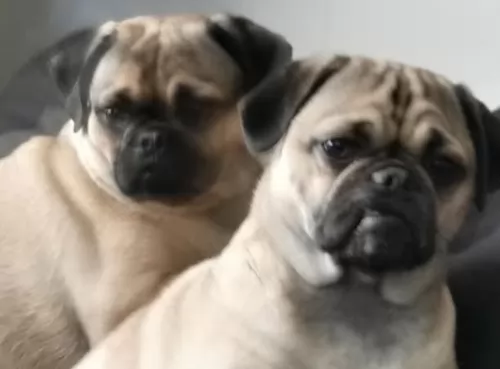 This crossbreed has a definite propensity to overeat and become obese from puppyhood. Feed the puppy a small dog dry food 3-4 times a day a total of ¾ of a cup to 1 cup.
This crossbreed has a definite propensity to overeat and become obese from puppyhood. Feed the puppy a small dog dry food 3-4 times a day a total of ¾ of a cup to 1 cup.
Again don’t over feed the adult Muggin or he will become obese easily. Feed at least twice a day one to one and half cups total.
High Energy
With the athleticism of the Min Pin taking precedence over the less active Pug, the Muggin is a fairly active dog. The Muggin is also not effective by the Pug’s difficulty with heat and cold. They love to go on long walks and need exercise to keep from being bored and destructive. However, remember there is a Pug in your Muggin and if she is not into exercise don’t try to get her to do more than she can.
You do want your Muggin to get enough exercise to fend off any tendency to be overweight. They are good at agility, jogging, obedience and watchdog activities.